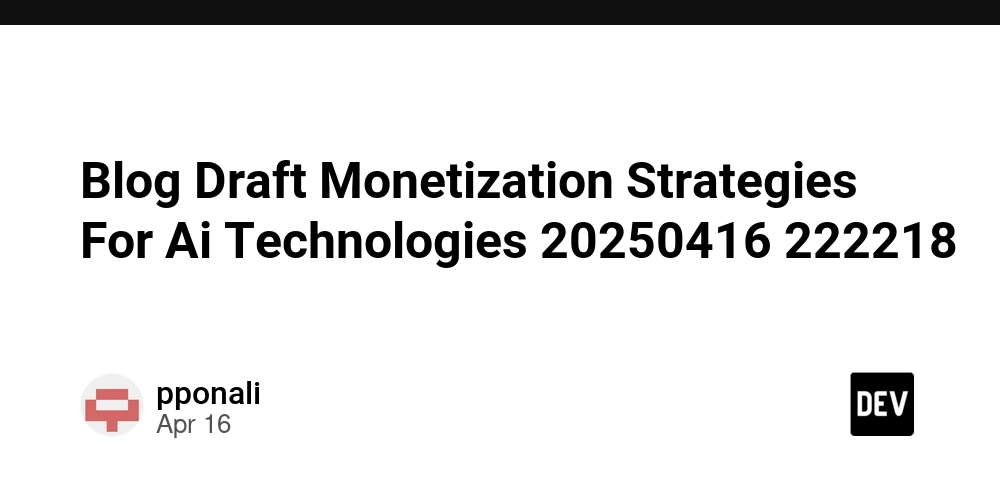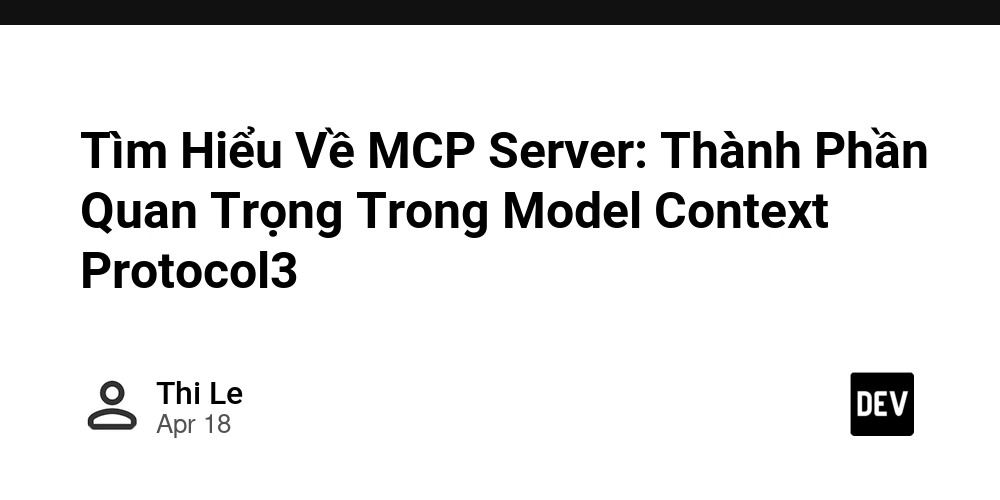Blog Draft Monetization Strategies For Ai Technologies 20250416 222218
Blog Draft Monetization Strategies For Ai Technologies 20250416 222218 Generated: 2025-04-16 22:22:18 Monetization Strategies for AI Technologies: Unlocking Revenue Potential_In today’s rapidly evolving tech environment, the integration of Artificial Intelligence (AI) has transformed not only how businesses operate but also how they monetize their innovations. As AI technologies continue to permeate various industries—such as finance, healthcare, e-commerce, and technology—understanding effective monetization strategies is essential for organizations aiming to leverage AI. Target Audience: Who Benefits from AI Monetization? Identifying the target audience is crucial to effective monetization schemes. The primary groups benefiting from AI technologies typically include: Business Executives: These are decision-makers who focus on implementing AI solutions to improve their business processes and enhance customer engagement. Developers and Engineers: This tech-savvy demographic is eager to explore AI frameworks and tools that can assist with application development. Data Analysts: These professionals rely on AI-generated insights for strategic decision-making across various sectors. Recent research underscores growing adoption rates in AI technologies: NLP Adoption: As per Deloitte's 2023 survey, 62% of organizations are utilizing Natural Language Processing (NLP) technologies. Machine Learning Integration: 37% of organizations report having successfully integrated machine learning solutions, emphasizing the escalating demand for innovative AI applications. Core Value Proposition: Leverage AI to Drive Business Efficiency At the heart of monetizing AI technologies lies a compelling value proposition: Advanced Insights: Businesses can utilize AI for predictive analytics and enhanced customer engagement. Cost Reduction: AI solutions often enable significant operational cost reductions through automation and optimized resource allocation. Competitive Advantage: Organizations that implement AI trends and technologies allow themselves to stay ahead of competitors, securing a relevant market position. This unique value proposition can serve as a springboard for various monetization strategies. Standard Monetization Streams: Tried-and-True Approaches Licensing AI Software Licensing proprietary AI algorithms enables companies to generate revenue while allowing other firms to implement advanced functionalities without steep development costs. Examples: Hugging Face provides licensing for their NLP models, encouraging businesses to deploy AI-powered solutions seamlessly. Learn more here. Actionable Advice: Evaluate your algorithms and determine if they can be productized for licensing. Ensure contracts are clear about usage rights and application fields. AI-as-a-Service (AIaaS) By offering AI capabilities as a service on a subscription basis, companies can provide access to AI technologies without anyone undertaking large upfront investments. Examples: IBM Watson's services span various sectors such as healthcare and customer support, through easily accessible AI solutions. Explore IBM Watson. Actionable Advice: Develop tiered pricing for AIaaS that allows for gradual upgrades, ensuring customers can select services according to their growing requirements. Consulting Services Consultation services geared towards AI integration enable companies to support businesses effectively in identifying suitable AI technologies for their unique needs. Example: Accenture offers specialized AI consulting services aimed to enhance operational efficiency among their clientele. Discover Accenture's services. Actionable Advice: Create a set of scalable consulting packages tailored toward varying levels of AI integration—from initial assessments to full implementation strategies. Creative Monetization Streams: Innovative Approaches Compelling Storytelling Creating a narrative around AI applications can create stronger emotional connections with audiences and drive higher engagement. Application: Develop case studies that illustrate how businesses tackled specific challenges via AI solutions, thus making these stories relatable and inspiring. Utilizing Infographics Visually engaging infographics can break down complex AI concepts and enhance audience retention while facilitating information sharing. Application: Design infographics that illustrate AI trends and statistics; leverage social media to drive their reach and shareability. Challenges & Collaborations Host competitions and invite collaborations with industry influencers to heighten engagement and brand visibility in the realm of AI. Application: Organize hackathons or challenges, incentivizing audience participation in AI technology trials, thus nurturing community around shared goals. Implementation Priorities: Turning Strategies into Action To achieve effective mon

Blog Draft Monetization Strategies For Ai Technologies 20250416 222218
Generated: 2025-04-16 22:22:18
Monetization Strategies for AI Technologies: Unlocking Revenue Potential_In today’s rapidly evolving tech environment, the integration of Artificial Intelligence (AI) has transformed not only how businesses operate but also how they monetize their innovations. As AI technologies continue to permeate various industries—such as finance, healthcare, e-commerce, and technology—understanding effective monetization strategies is essential for organizations aiming to leverage AI.
Target Audience: Who Benefits from AI Monetization?
Identifying the target audience is crucial to effective monetization schemes. The primary groups benefiting from AI technologies typically include:
- Business Executives: These are decision-makers who focus on implementing AI solutions to improve their business processes and enhance customer engagement.
- Developers and Engineers: This tech-savvy demographic is eager to explore AI frameworks and tools that can assist with application development.
- Data Analysts: These professionals rely on AI-generated insights for strategic decision-making across various sectors. Recent research underscores growing adoption rates in AI technologies:
- NLP Adoption: As per Deloitte's 2023 survey, 62% of organizations are utilizing Natural Language Processing (NLP) technologies.
- Machine Learning Integration: 37% of organizations report having successfully integrated machine learning solutions, emphasizing the escalating demand for innovative AI applications.
Core Value Proposition: Leverage AI to Drive Business Efficiency
At the heart of monetizing AI technologies lies a compelling value proposition:
- Advanced Insights: Businesses can utilize AI for predictive analytics and enhanced customer engagement.
- Cost Reduction: AI solutions often enable significant operational cost reductions through automation and optimized resource allocation.
- Competitive Advantage: Organizations that implement AI trends and technologies allow themselves to stay ahead of competitors, securing a relevant market position. This unique value proposition can serve as a springboard for various monetization strategies.
Standard Monetization Streams: Tried-and-True Approaches
- Licensing AI Software Licensing proprietary AI algorithms enables companies to generate revenue while allowing other firms to implement advanced functionalities without steep development costs. Examples:
- Hugging Face provides licensing for their NLP models, encouraging businesses to deploy AI-powered solutions seamlessly. Learn more here. Actionable Advice: Evaluate your algorithms and determine if they can be productized for licensing. Ensure contracts are clear about usage rights and application fields.
- AI-as-a-Service (AIaaS) By offering AI capabilities as a service on a subscription basis, companies can provide access to AI technologies without anyone undertaking large upfront investments. Examples:
- IBM Watson's services span various sectors such as healthcare and customer support, through easily accessible AI solutions. Explore IBM Watson. Actionable Advice: Develop tiered pricing for AIaaS that allows for gradual upgrades, ensuring customers can select services according to their growing requirements.
- Consulting Services Consultation services geared towards AI integration enable companies to support businesses effectively in identifying suitable AI technologies for their unique needs. Example:
- Accenture offers specialized AI consulting services aimed to enhance operational efficiency among their clientele. Discover Accenture's services. Actionable Advice: Create a set of scalable consulting packages tailored toward varying levels of AI integration—from initial assessments to full implementation strategies.
Creative Monetization Streams: Innovative Approaches
- Compelling Storytelling Creating a narrative around AI applications can create stronger emotional connections with audiences and drive higher engagement. Application: Develop case studies that illustrate how businesses tackled specific challenges via AI solutions, thus making these stories relatable and inspiring.
- Utilizing Infographics Visually engaging infographics can break down complex AI concepts and enhance audience retention while facilitating information sharing. Application: Design infographics that illustrate AI trends and statistics; leverage social media to drive their reach and shareability.
- Challenges & Collaborations Host competitions and invite collaborations with industry influencers to heighten engagement and brand visibility in the realm of AI. Application: Organize hackathons or challenges, incentivizing audience participation in AI technology trials, thus nurturing community around shared goals.
Implementation Priorities: Turning Strategies into Action
To achieve effective monetization, the following priority actions should be prioritized:
- Define Product Fit and Value Proposition Clear articulation of how your AI solutions uniquely address target audience needs will strengthen positioning.
- Develop Strategic Partnerships Form alliances with businesses that can effectively incorporate AI into their operations, increasing your market reach and business impact. For instance, partner with e-commerce businesses to facilitate AI-driven customer recommendations.
- Invest in Marketing Initiatives Deploy robust digital marketing strategies, including SEO-optimized content and targeted advertising, to build awareness and attract potential customers.
- Create Engaging Content Consistently produce valuable content that informs your audience about AI technologies and their practical applications, driving community engagement and propping up brand loyalty.
- Feedback Loops and Iteration Establish systems for capturing user feedback, which will allow continual refinement of your product offerings in alignment with customer requirements and market dynamics.
Success Metrics: Measuring Monetization Effectiveness
To effectively assess the success of monetization strategies, consider the following metrics:
- Customer Acquisition Cost (CAC) Monitor your cost related to acquiring new customers through marketing campaigns versus the revenue generated.
- Customer Lifetime Value (CLV) Evaluate the total expected revenue from a customer throughout their engagement with your brand, adjusting strategies accordingly.
- Engagement Metrics Track interactions, shares, and comments on published content and marketing material to gauge engagement levels with your audience.
- Conversion Rates Calculate the percentage of visitors or leads who convert to paying customers to measure the effectiveness of your sales approaches.
- Churn Rate Monitor the rate at which customers discontinue their relationship with your brand. Reducing churn can significantly profit your business.
Conclusion: The Potential of AI Monetization
The scope for monetizing AI technologies is vast and involves innovative and strategic approaches. By leveraging standard streams, such as licensing and consulting, combined with creative methods like storytelling and infographics, businesses can thrive in this expanding industry. Continuous assessment through success metrics, alongside adaptable strategies, will ensure sustainable growth and sustained relevance in this fast-paced tech sector.




























![[Webinar] AI Is Already Inside Your SaaS Stack — Learn How to Prevent the Next Silent Breach](https://blogger.googleusercontent.com/img/b/R29vZ2xl/AVvXsEiOWn65wd33dg2uO99NrtKbpYLfcepwOLidQDMls0HXKlA91k6HURluRA4WXgJRAZldEe1VReMQZyyYt1PgnoAn5JPpILsWlXIzmrBSs_TBoyPwO7hZrWouBg2-O3mdeoeSGY-l9_bsZB7vbpKjTSvG93zNytjxgTaMPqo9iq9Z5pGa05CJOs9uXpwHFT4/s1600/ai-cyber.jpg?#)














































































































































![[The AI Show Episode 144]: ChatGPT’s New Memory, Shopify CEO’s Leaked “AI First” Memo, Google Cloud Next Releases, o3 and o4-mini Coming Soon & Llama 4’s Rocky Launch](https://www.marketingaiinstitute.com/hubfs/ep%20144%20cover.png)




































































































































































































![Rogue Company Elite tier list of best characters [April 2025]](https://media.pocketgamer.com/artwork/na-33136-1657102075/rogue-company-ios-android-tier-cover.jpg?#)








































































_Andreas_Prott_Alamy.jpg?width=1280&auto=webp&quality=80&disable=upscale#)






































































































![Apple Watch Series 10 Back On Sale for $299! [Lowest Price Ever]](https://www.iclarified.com/images/news/96657/96657/96657-640.jpg)
![EU Postpones Apple App Store Fines Amid Tariff Negotiations [Report]](https://www.iclarified.com/images/news/97068/97068/97068-640.jpg)
![Apple Slips to Fifth in China's Smartphone Market with 9% Decline [Report]](https://www.iclarified.com/images/news/97065/97065/97065-640.jpg)


































































































































